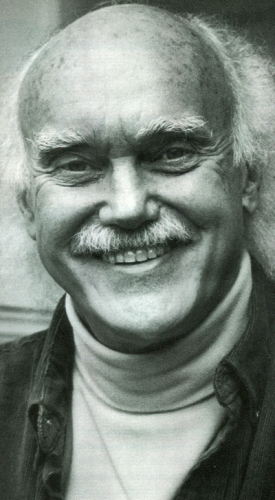
Ram Dass turns eighty years old today. For those of you who aren’t familiar with Ram Dass (born Richard Alpert), the man is a legend. It’s hard to overestimate his role in shifting America’s collective spiritual consciousness. He was one of those first bold individuals to look East during a time of great spiritual need, and many of the flock swiftly followed his lead.
Digging through the Tricycle archives this morning, I came across a gem in a collection of his one-liners, called “Little ‘Aha!’s“: “Our whole spiritual transformation brings us to the point where we realize that in our own being, we are enough.” I like that because, at least in my own experience, one does need to take a journey in order to “be here now.” And because we’re always changing, the journey doesn’t end, if we’re doing it right. We’ll transform until death (at least). Ram Dass, who, in 1997, suffered a stroke that made it difficult for him to express himself with language, knows the truth of this continual transformation. A couple of years after his stroke we interviewed him about how it affected his outlook on life.
What have you learned from your stroke? One of the things my guru said is that when he suffers, it brings him closer to God. I have found this, too. The stroke is benevolent because the suffering is bringing me closer to God. It’s the guru’s grace, and his blessing is the stroke. Before the stroke, I enjoyed playing golf, driving my MG sports car, playing my cello. Now I can’t do any of those things. I can’t do, do, do all the time.The way I approach what happened is that with the stroke I began a new incarnation. In the last incarnation I was a golfer, a sports car driver, a musician. Now I have given all that up. The psychological suffering only comes if I compare incarnations—if I say, oh, I used to be able to play the cello. So I say my guru has stroked me, to bring me closer to a spiritual domain.
I’ve learned that silence is good. I knew that before, but I’ve learned it thoroughly now. I’ve learned about helping. In my life before the stroke, I was a “helper,” and serving was power. Now I am powerless. Instead of my book How Can I Help?, now I can have a book called How Can You Help Me? From the point in the morning when I wake up, I need help: Going to the bathroom, eating, going anywhere, I need to ask for help from those around me. That’s powerlessness. But I’ve learned that even that role can be played with compassion, so that my helpers and I can serve each other.
How has your stroke affected your spiritual outlook? It’s gotten me deeper into karma yoga. This is my karma, and it is also my yoga. I think that it’s taught me more about how suffering is a stepping-stone toward a spiritual goal. My stroke has also affected people. I was a spiritual friend for many, many people—through my books, tapes, or lectures. I was an identification figure for them, and the stroke shook them. They couldn’t figure out why a person with such spiritual naches could suffer a stroke. It undermined the feeling that only good comes to those who are good. I wanted to open the hearts of people, and my stroke did this much more than my books, tapes, or anything else.
Read the rest of the interview here.
Thank you for subscribing to Tricycle! As a nonprofit, we depend on readers like you to keep Buddhist teachings and practices widely available.